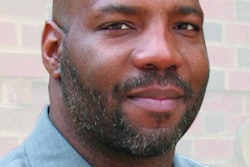While in graduate school, a professor of Dr. Yohuru Williams’ told him that his scholarship was his ticket to the classroom and that he had a responsibility to make it relevant and have value. It’s something Williams never forgot.
But Williams never thought he’d be teaching, much less contemplating the relevancy of his research. Growing up, people frequently suggested he enter the legal profession, often commenting on his impressive speaking abilities. And whether it was a result of watching too many episodes of “L.A. Law,” as he confesses, or the high school internship at a law firm, Williams was essentially law-school bound when he entered the University of Scranton, and he planned to major in political science.
His history classes, however, became his passion, while the political science courses began to feel like a chore. It wasn’t long before a professor recommended Williams pursue a doctorate, and the rest, as they say, is history.
Yet Williams has not abandoned his interest in law. His primary area of research is African-American history, but more specifically African-Americans and the law. The Black Panthers have been the subject of several of his books and scholarly articles because of their encounters with the legal system, prompting him to write his first book, Black Politics/White Power: Civil Rights, Black Power and the Black Panthers in New Haven.
“They became one of the organizations most identified with the idea of armed self-defense. Huey Newton and Bobby Seale carrying around copies of the pocket Constitution … They really embody everything that I study — the law, the Constitution and American democracy,” Williams says.
Dr. Peniel E. Joseph, associate professor of Africana Studies at Brandeis University, says Williams is one of the most exciting scholars of his generation.
“He’s written the first local case study of the Black Panthers with his first book. It’s a groundbreaking study that shows the ways in which the Panthers really evolved out of local struggles for community empowerment in New Haven,” says Joseph, author of Waiting ‘Til the Midnight Hour: A Narrative History of Black Power in America.
Williams has also written extensively about race and capital punishment and is currently working on a book titled Six Degrees of Segregation, Lynching and Capital Punishment in the United States, 1865-1930.
He says he finds the legal aspect compelling because it has been African-Americans and other minorities that have forced the United States to live up to the principles championed in the country’s founding documents. Furthermore, says Williams, the criminal justice system remains “the last bastion of segregation in America,” where Blacks and other minorities are often punished more harshly.
“For me, the best way to contribute to that discussion was to try to write a book that makes the case that our justice system has not been color blind. And we have to express that imbalance before we can talk about having free justice in this country,” Williams says. While he has become a prolific writer, Williams “lives for the classroom.” He was twice nominated for teacher of the year when he was a professor at Delaware State University. His current project while on sabbatical accommodates his passion for teaching and professional development. He is serving a one-year stint as a vice president at the American Institute for History Education, where, among other things, he will develop and create new teaching methodologies for middle and high school teachers.
Through his research Williams will continue to shed light on the African-American experience, but he believes that the relevancy of his work also involves helping to train the next generation of scholars. He encourages aspiring academicians to be persistent in their scholarly endeavors.
“At the end of the day, it’s believing that you have something to offer the world. That’s what got me through, and it’s what I always tell graduate students that I’m blessed to work with,” says Williams. “To let them know that no matter what they encounter, this journey is for a reason.”
Title: Associate Professor of History and Co-Director of Black Studies, fairfield University
Education: Ph.D., 20th Century U.S. History and African-American History, Howard University; M.A., History, and B.A., History and Political Science, University of Scranton















